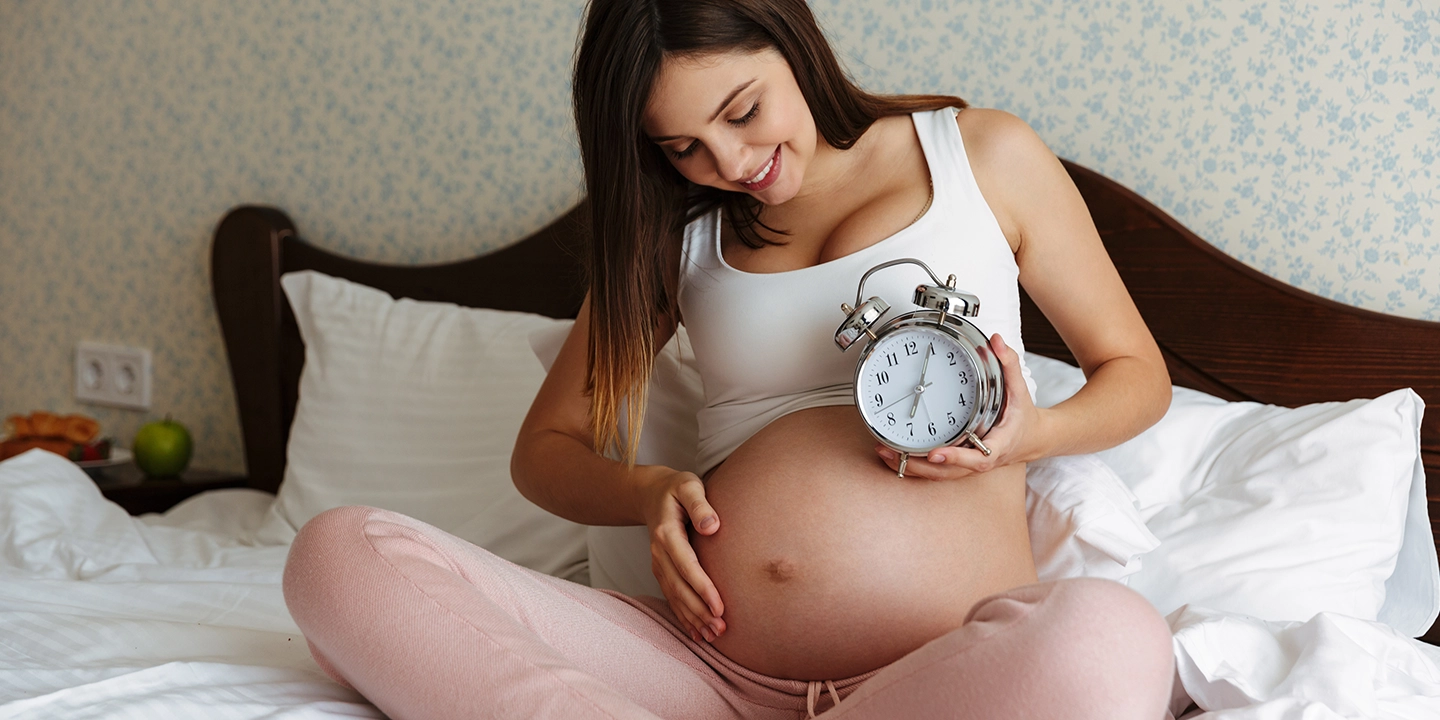
At 21 weeks pregnant, you’re in the second half of your pregnancy. Your baby’s movements become more pronounced as they gain control over their limbs.
Stretch marks may appear on your expanding belly. These streaks can vary in colour and are a normal part of pregnancy. If you have any apprehensions, discuss with your healthcare provider.
Learn more about baby development, symptoms, and tips for being 21 weeks pregnant.
In this Article
21 Week Pregnant – Baby Development
Here are the key points about your baby’s development at 21 weeks pregnant:
- The baby is about 10.5 inches long, similar to the size of a carrot.
- Their weight is approximately 0.75 pounds (340g) or 14.1 ounces (400g).
- The placenta still provides most of the baby’s nutrients, but its digestive system is developing.
- The pancreas produces enzymes for food digestion.
- The small intestine is growing longer and absorbing nutrients from swallowed amniotic fluid.
- The bone marrow is starting to produce red blood cells, taking over from the liver.
- The baby’s eyelids, which fused together at around week 11, are now beginning to separate.
- At 21 weeks pregnant, your baby’s heartbeat is audible with a stethoscope, although it may be challenging to differentiate it from your own.
- The baby’s heartbeat is faster, ranging from 120 to 160 beats per minute, approximately double the rate of an adult’s heartbeat.
- Their arms and legs are now in proportion, allowing for more controlled movements. You may feel frequent fetal kicks because of their movement.
- Neurons connecting the brain to muscles are developing, enhancing motor skills.
Related Blog: 20 Week Pregnant: Symptoms, Tips and Baby Development
21 Weeks Pregnant Is How Many Months?
At 21 weeks pregnant, you have reached the five-month mark, although doctors typically track pregnancy by week rather than month. With a pregnancy duration of 40 weeks, you are now well into the majority of your pregnancy journey!
21 Weeks Pregnant Bump
At 21 weeks pregnant, your baby bump is growing steadily. You may notice a visible roundness in your abdomen as your baby continues to develop. The size of your bump may vary depending on factors such as your body shape and the position of the baby. You may also notice the appearance of stretch marks on your abdomen. These marks can vary in colour and may be pink, red, purple, or dark brown.
21 Weeks Pregnant Symptoms
- Feeling gentle kicks
At 21 weeks, you’ll experience the joy of feeling your baby’s movements as they wiggle and nudge in the womb.
- Bloating and increased flatulence
The growing uterus exerts pressure on your bowel, resulting in more frequent gas and bloating. Stay hydrated and consume fibre-rich foods to alleviate constipation.
Relate Blog: 10 Indian Foods to Avoid after an Abortion and 5 Foods to Eat to Help You Heal Faster
- Increased appetite
As your baby grows, their increased nutrient needs lead to cravings and frequent snacking. Opt for healthier choices like fruit to avoid heartburn.
- Braxton Hicks contractions
These practice contractions are normal, but if they disappear when you change positions, they are harmless. They may occur after exercising.
- Back pain
The expanding belly and hormone, relaxin cause strain on the back muscles, resulting in constant discomfort. Practice good posture and consider prenatal exercises to strengthen your back.
- Acne
Hormonal changes at the time of pregnancy can make your skin oily, leading to acne breakouts or worsening of existing acne. Maintain a gentle skincare routine and consult your doctor for safe treatments.
- Varicose veins
Increased pressure on the legs can cause varicose veins. Stay active, avoid prolonged standing or sitting, and consider wearing compression stockings as recommended by your doctor.
- Urinary tract infections
The growing uterus can obstruct the flow of urine, increasing the risk of UTIs. Stay hydrated, urinate regularly, and consult your healthcare provider for safe treatment options.
Related Blog: 19 Week Pregnant: Symptoms, Tips, and Baby Development
21 Weeks Pregnant – Tips to Follow
- Stay hydrated to alleviate symptoms and prevent water retention and UTIs.
- Engage in regular exercise to reduce swelling and improve circulation, such as prenatal yoga or walking.
- Sign up for childbirth, breastfeeding, or infant care classes in advance to secure your spot.
- Clear nasal congestion by gently blowing one nostril at a time or using safe OTC decongestants or antihistamines.
- Elevate your feet to reduce swelling in your feet and ankles caused by increased fluid volume.
- Monitor your weight gain and follow your practitioner’s recommendations for a healthy pace of gain.
- Walk for 30 minutes a day to stimulate bowel movements and fight constipation.
- Avoid hair removal treatments like lasers and bleaching until after giving birth.
- Make to-do lists and leave reminders to combat forgetfulness and trouble concentrating.
- Consume nutrient-rich foods instead of empty calories to support healthy pregnancy weight gain.
- Get ready to start fetal movement counting.
Takeaway at Twenty-One Weeks Pregnant
When you are twenty-one weeks pregnant, your baby’s development is in full swing. They are around 10.5 inches long and weigh about three-quarters of a pound. You may feel their coordinated movements and even hear their heartbeat. However, symptoms like a stuffy nose, swollen feet, and pregnancy brain may persist. Stay hydrated, exercise regularly, and prioritize self-care. Monitor your weight gain and make nutritious choices.
Remember, if you have any concerns, consult your healthcare provider. For expert prenatal care and support, consider visiting Queen’s Gynecology in Delhi. Call now to schedule an appointment and ensure a healthy pregnancy journey.
Related Blog: 8 Surprising Things Unborn Babies Usually Do In The Womb
Summary
At 21 weeks pregnant, your baby is developing rapidly. You may experience symptoms such as feeling your baby’s movements, bloating, increased appetite, back pain, acne, varicose veins, and Braxton Hicks contractions. It’s important to stay hydrated, exercise, attend prenatal classes, manage nasal congestion, elevate your feet, and monitor weight gain. Consult with your healthcare provider for any concerns. If you haven’t scheduled an ultrasound, do it now!
| Week | Pregnancy Symptoms | Tips and Advice | Baby Development |
| Week 1 | – Missed period | – Take a home pregnancy test | – Fertilization occurs |
| Week 2 | – Tender breasts | – Begin taking prenatal vitamins | – Blastocyst implants in the uterus |
| Week 3 | – Fatigue | – Schedule your first prenatal visit | – Embryonic development begins |
| Week 4 | – Morning sickness starts | – Avoid alcohol, smoking, and caffeine | – Neural tube forms |
| Week 5 | – Increased urination | – Eat a balanced diet | – Heart starts beating |
| Week 6 | – Mood swings | – Stay hydrated | – Brain and head development |
| Week 7 | – Constipation | – Start gentle exercise | – Limb buds form |
| Week 8 | – Food cravings | – Get plenty of rest | – Webbed fingers and toes develop |
| Week 9 | – Weight gain begins | – Avoid raw or undercooked foods | – Tail disappears, now considered a fetus |
| Week 10 | – Visible baby bump | – Wear comfortable clothing | – Organs continue to develop |
| Week 11 | – Darkened areolas | – Practice relaxation techniques | – Baby can swallow and produce urine |
| Week 12 | – Reduced nausea | – Consider prenatal classes | – Sex organs distinguishable |
| Week 13 | – Increased energy | – Continue regular check-ups | – Baby’s fingerprints form |
| Week 14 | – Less frequent urination | – Plan for maternity leave | – Baby’s facial muscles develop |
| Week 15 | – Quickening (baby moves) | – Do pelvic floor exercises | – Baby can make facial expressions |
| Week 16 | – Round ligament pain | – Stay active with low-impact exercises | – Develops sense of hearing |
| Week 17 | – Nasal congestion | – Consider a prenatal massage | – Baby’s skeleton starts hardening |
| Week 18 | – Belly button changes | – Stay well-hydrated | – Vernix caseosa covers the skin |
| Week 19 | – Braxton Hicks contractions | – Eat small, frequent meals | – Baby’s kicks become stronger |
| Week 20 | – Leg cramps | – Begin monitoring baby’s movements | – Baby is covered in lanugo (fine hair) |
| Week 21 | – Shortness of breath | – Sleep on your side | – Eyebrows and eyelashes appear |
| Week 22 | – Linea nigra (skin darkens) | – Practice relaxation techniques | – Rapid brain development |
| Week 23 | – Backache | – Consider prenatal yoga or swimming | – Baby can recognize your voice |
| Week 24 | – Swollen ankles | – Elevate feet when sitting or lying | – Lungs continue to mature |
| Week 25 | – Increased appetite | – Continue regular prenatal check-ups | – Baby may respond to loud noises |
| Week 26 | – Heartburn | – Sleep with extra pillows for support | – Eyes open for the first time |
| Week 27 | – Braxton Hicks intensify | – Pack your hospital bag | – Baby can hiccup |
| Week 28 | – Trouble sleeping | – Monitor blood pressure | – Baby’s kicks become more regular |
| Week 29 | – Shortness of breath | – Avoid lifting heavy objects | – Baby’s bones fully developed |
| Week 30 | – Swollen hands | – Stay hydrated and avoid salt | – Baby may be head-down in preparation for birth |
| Week 31 | – Increased vaginal discharge | – Take childbirth classes | – Baby’s immune system develops |
| Week 32 | – Hemorrhoids | – Practice perineal massage | – Baby’s toenails and fingernails grow |
| Week 33 | – Trouble finding a comfortable position to sleep | – Rest and nap when possible | – Baby’s bones start to harden further |
| Week 34 | – Frequent urination | – Prepare for maternity leave | – Baby’s central nervous system matures |
| Week 35 | – Braxton Hicks increase | – Avoid prolonged standing or sitting | – Baby’s skin becomes less wrinkled |
| Week 36 | – Pelvic pressure | – Finalize birth plan | – Baby continues to gain weight |
| Week 37 | – Lightening (baby drops) | – Stay active with walking | – Baby’s head positions for birth |
| Week 38 | – Fatigue increases | – Do pelvic exercises | – Baby’s lungs are fully mature |
| Week 39 | – Cervix effacement | – Rest and conserve energy | – Baby’s immune system continues to develop |
| Week 40 | – Contractions begin | – Monitor contractions | – Baby’s digestive system is ready for breast milk |
| Week 41 | – Dilation of cervix | – Stay calm and patient during labor | – Baby’s head molds to fit through the birth canal |
Please note that every pregnancy is unique, and symptoms and developments may vary from person to person. Always consult with a healthcare professional for personalized advice and care during pregnancy.























































































































































































